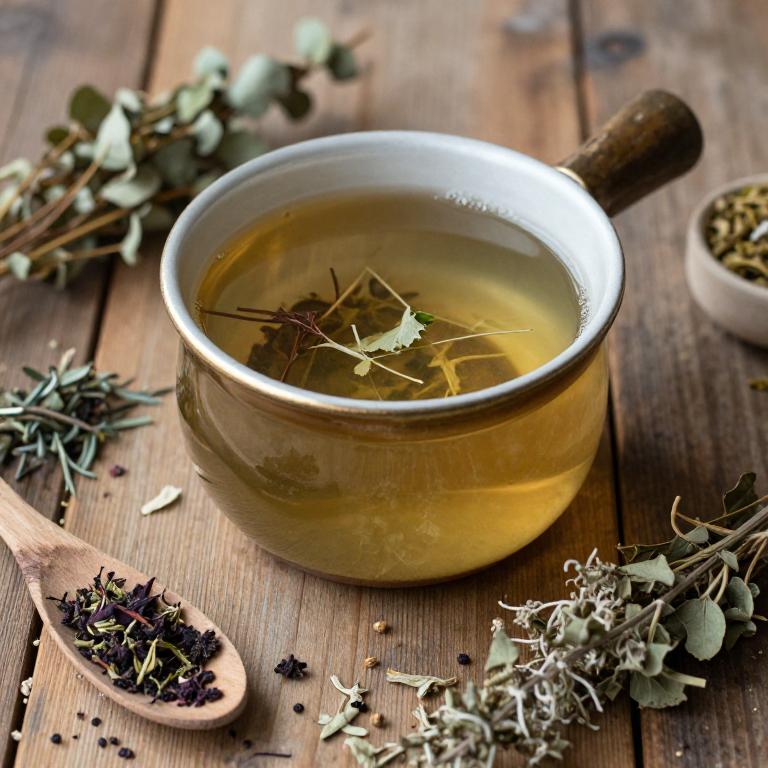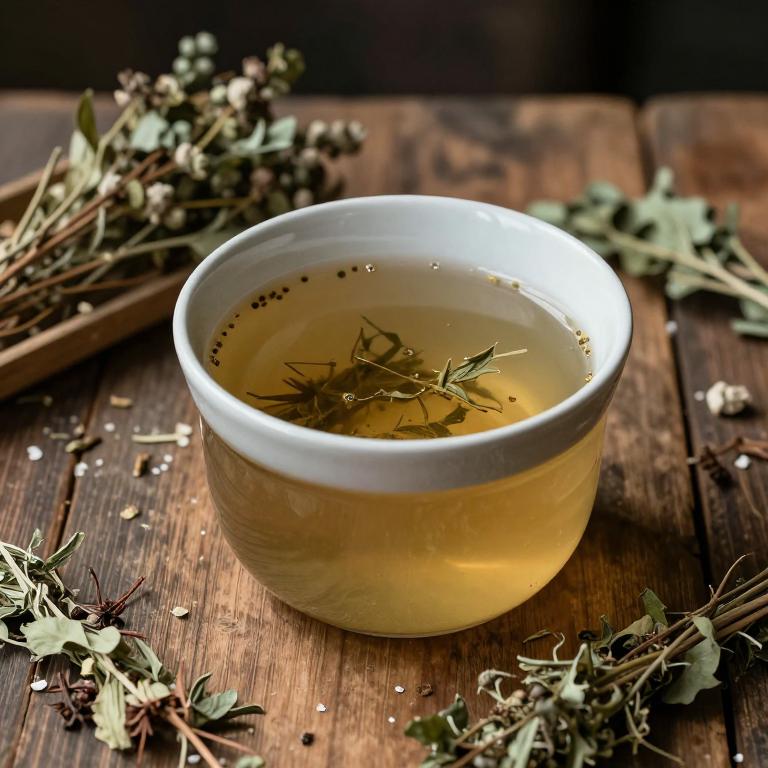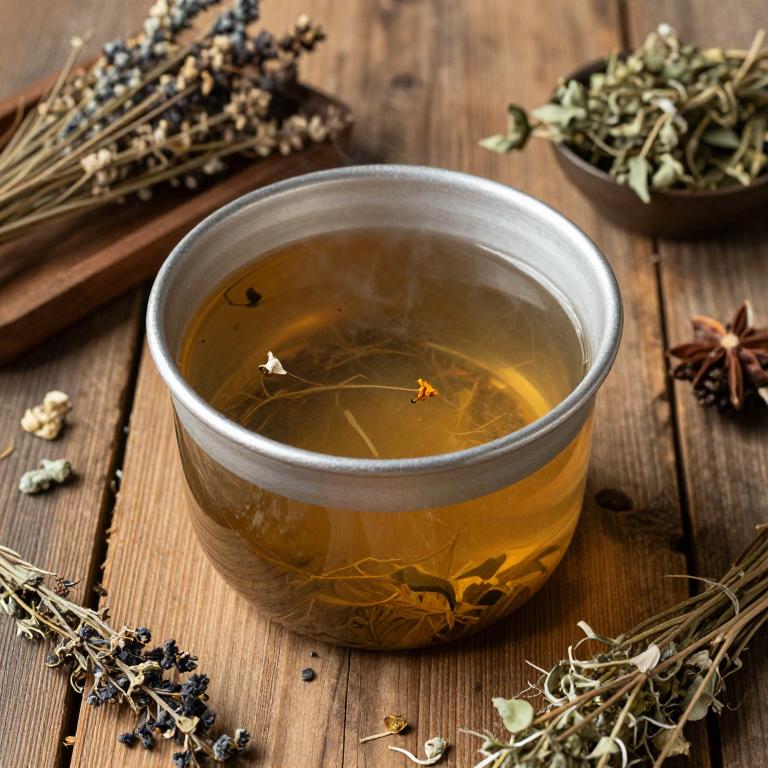10 Best Herbal Decoctions For Dry Scalp

Herbal decoctions can be an effective natural remedy for dry scalp, as they often contain soothing and nourishing ingredients like nettle, chamomile, and lavender.
To prepare a decoction, these herbs are simmered in water for several minutes to extract their beneficial compounds, creating a nutrient-rich infusion. Applying the warm decoction to the scalp can help moisturize, reduce inflammation, and promote scalp health by improving circulation. Regular use may help alleviate symptoms such as itchiness and flakiness associated with dryness.
However, it's important to perform a patch test first to ensure no allergic reactions occur.
Table of Contents
- 1. Stinging nettle (Urtica dioica)
- 2. St. john's wort (Hypericum perforatum)
- 3. Field horsetail (Equisetum arvense)
- 4. Rosemary (Rosmarinus officinalis)
- 5. Salvia (Salvia officinalis)
- 6. Melaleuca (Melaleuca alternifolia)
- 7. Camellia (Camellia sinensis)
- 8. Aloe vera (Aloe barbadensis)
- 9. Lemon grass (Cymbopogon citratus)
- 10. Yarrow (Achillea millefolium)
1. Stinging nettle (Urtica dioica)

Urtica dioica, commonly known as stinging nettle, has been traditionally used in herbal medicine for its potential benefits in treating dry scalp.
A decoction of stinging nettle leaves can be prepared by boiling the fresh or dried leaves in water for several minutes, then allowing it to steep. This herbal remedy is believed to help soothe irritation and reduce flakiness due to its high content of minerals and anti-inflammatory properties. The decoction can be applied as a scalp rinse or used as a compress to nourish and moisturize the scalp.
While it is generally considered safe, individuals with allergies or sensitive skin should perform a patch test before using it regularly.
2. St. john's wort (Hypericum perforatum)

Hypericum perforatum, commonly known as St. John's Wort, is a herb traditionally used for its potential therapeutic effects on the scalp and skin.
When prepared as a herbal decoction, it can be used to address dry scalp by promoting skin hydration and reducing inflammation. The decoction is typically made by simmering the dried plant material in water for an extended period to extract its active compounds. Its anti-inflammatory and antimicrobial properties may help alleviate symptoms such as flaking, itching, and irritation associated with dry scalp.
However, it is important to consult a healthcare professional before use, as St. John's Wort can interact with certain medications.
3. Field horsetail (Equisetum arvense)

Equisetum arvense, commonly known as horsetail, is often used in herbal decoctions to address dry scalp due to its high silica content, which promotes scalp health and hair strength.
To prepare the decoction, dried horsetail is simmered in water for about 20 minutes, then strained and applied as a rinse or used in a compress. This herbal remedy is believed to help reduce flakiness and irritation by improving moisture retention and enhancing the scalp’s natural barrier function. It is typically used in conjunction with other scalp treatments for optimal results.
However, it is important to consult a healthcare provider before use, especially for those with allergies or existing scalp conditions.
4. Rosemary (Rosmarinus officinalis)

Rosmarinus officinalis, commonly known as rosemary, is widely used in herbal decoctions for its potential benefits in treating dry scalp.
The leaves of this aromatic plant are often boiled to create a soothing herbal infusion that can be applied topically to the scalp. This decoction is believed to improve circulation, reduce dandruff, and provide moisture to the scalp, which helps alleviate dryness and itching. Its essential oils, such as camphor and eucalyptol, contribute to its antimicrobial and anti-inflammatory properties, making it effective in combating scalp infections.
Regular use of rosemary decoctions may promote healthier hair growth and enhance the overall condition of the scalp.
5. Salvia (Salvia officinalis)

Salvia officinalis, commonly known as sage, has been traditionally used in herbal medicine for its soothing and anti-inflammatory properties.
When prepared as a decoction, sage can help alleviate symptoms of dry scalp by moisturizing and balancing the skin's natural oils. To make the decoction, dried sage leaves are simmered in water for about 15 to 20 minutes, then strained and cooled before application. This herbal remedy is believed to reduce itchiness and redness associated with dryness.
However, it is advisable to perform a patch test first and consult a healthcare professional if symptoms persist or worsen.
6. Melaleuca (Melaleuca alternifolia)

Melaleuca alternifolia, commonly known as tea tree oil, is often used in herbal decoctions to treat dry scalp due to its antimicrobial and anti-inflammatory properties.
These decoctions typically involve infusing dried leaves of the plant in hot water to create a soothing rinse or topical application. The essential oils in melaleuca alternifolia help to reduce dandruff and irritation while moisturizing the scalp. Regular use of such decoctions can improve scalp health and alleviate the discomfort associated with dryness.
However, it is important to dilute the oil properly to avoid skin irritation and consult a healthcare professional before use, especially for those with sensitive skin.
7. Camellia (Camellia sinensis)

Camellia sinensis, commonly known as the plant from which green and black teas are derived, contains bioactive compounds such as polyphenols and catechins that may benefit scalp health.
Herbal decoctions made from Camellia sinensis leaves are traditionally used in some cultures to soothe dry scalp due to their anti-inflammatory and antimicrobial properties. These decoctions can help reduce scalp irritation and promote moisture retention by improving blood circulation to the scalp. When applied topically, they may offer a natural alternative to commercial shampoos for those seeking gentle, plant-based treatments.
However, it is important to consult a healthcare professional before using Camellia sinensis decoctions, especially if you have sensitive skin or existing scalp conditions.
8. Aloe vera (Aloe barbadensis)

Aloe barbadensis, commonly known as aloe vera, has been widely used for its soothing and healing properties, including its effectiveness in treating dry scalp conditions.
Herbal decoctions made from aloe barbadensis involve boiling the gel or leaves to extract its active compounds, which can then be applied topically to the scalp. These decoctions are rich in nutrients such as vitamins, minerals, and antioxidants that help moisturize and nourish the scalp, reducing dryness and flakiness. The anti-inflammatory and antimicrobial properties of aloe barbadensis may also help alleviate scalp irritation and promote a healthier environment for hair growth.
Regular use of aloe barbadensis decoctions can provide a natural, gentle remedy for those suffering from chronic dry scalp issues.
9. Lemon grass (Cymbopogon citratus)

Cymbopogon citratus, commonly known as lemon grass, is a herbal plant widely used in traditional medicine for its therapeutic properties.
When prepared as a decoction, lemon grass can be beneficial for treating dry scalp due to its antimicrobial and anti-inflammatory effects. The decoction is typically made by boiling the dried leaves in water, allowing the active compounds to infuse into the liquid. This herbal remedy helps to soothe irritation, reduce dandruff, and moisturize the scalp, promoting healthier hair growth.
Regular use of lemon grass decoction may provide natural relief for those suffering from dryness and discomfort associated with a dry scalp.
10. Yarrow (Achillea millefolium)

Achillea millefolium, commonly known as yarrow, has been traditionally used in herbal medicine for its anti-inflammatory and soothing properties, making it a potential remedy for dry scalp conditions.
When prepared as a herbal decoction, yarrow can be applied topically to the scalp to help reduce irritation and promote scalp health. The decoction is typically made by boiling the dried leaves and flowers of the plant in water, then allowing it to steep for several hours before use. This preparation may help to moisturize the scalp and alleviate symptoms such as flakiness and itching.
However, it is advisable to perform a patch test and consult with a healthcare professional before using yarrow decoctions, especially for those with sensitive skin or existing scalp conditions.